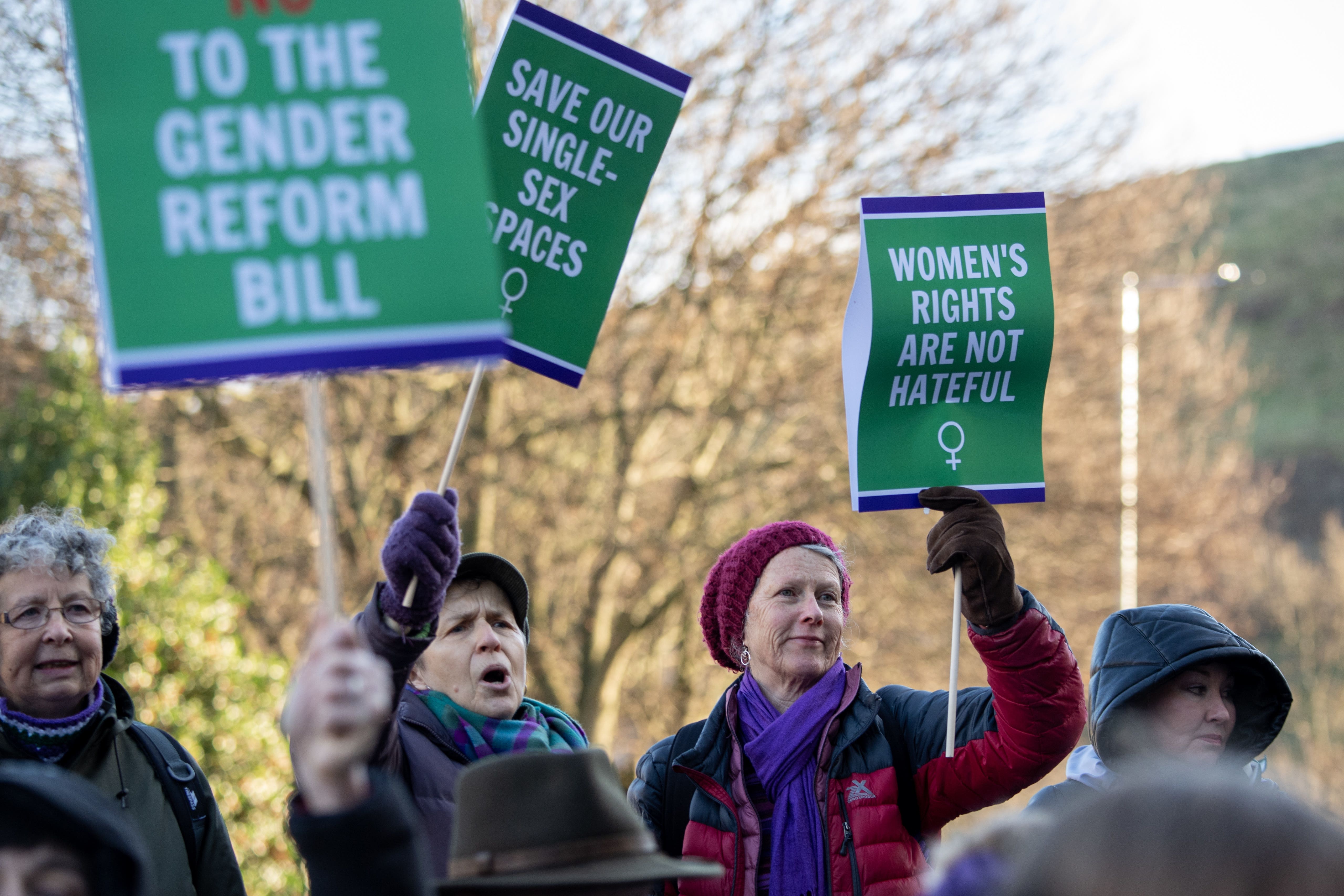Deadline nears for Rishi Sunak to decide on Scotland’s gender law
He would become the first Prime Minister to trigger Section 35 if he chooses to stand in the way of the SNP’s gender reforms

Your support helps us to tell the story
From reproductive rights to climate change to Big Tech, The Independent is on the ground when the story is developing. Whether it's investigating the financials of Elon Musk's pro-Trump PAC or producing our latest documentary, 'The A Word', which shines a light on the American women fighting for reproductive rights, we know how important it is to parse out the facts from the messaging.
At such a critical moment in US history, we need reporters on the ground. Your donation allows us to keep sending journalists to speak to both sides of the story.
The Independent is trusted by Americans across the entire political spectrum. And unlike many other quality news outlets, we choose not to lock Americans out of our reporting and analysis with paywalls. We believe quality journalism should be available to everyone, paid for by those who can afford it.
Your support makes all the difference.The deadline for Rishi Sunak to decide whether to block Scotland’s gender laws will arrive this week as he considers legal advice about its impact.
Multiple reports have suggested that the legal advice the UK Government has received will provide the Prime Minister with the cover he requires to trigger Section 35 of the Scotland Act.
If he does so, he will become the first No 10 incumbent to use the blocking mechanism.
The Scotland Act, which established a devolved Scottish government and parliament, gives Westminster four weeks to consider bills passed by Holyrood that could have an “adverse effect on the operation of the law”.
With the Gender Recognition Reform (Scotland) Bill passed by MSPs on December 22, the deadline will be reached on Wednesday.
The Bill will allow trans people to obtain a gender recognition certificate (GRC) without the need for a medical diagnosis — a process known as “self-identification”.
It will also permit 16 and 17-year-olds to apply for a GRC for the first time, and would reduce the amount of time a person has to live in their acquired gender before they can be granted the document.
According to the Financial Times, Mr Sunak — who said during a visit to Scotland last week that he was concerned by the gender law — is preparing to block the bill from entering the statute books, with a decision coming as soon as Monday.
The newspaper reported that the legal advice given to the Conservative Party leader states the Bill passed by Edinburgh “cuts across” UK-wide legislation on equalities.
Our concerns include the protection of single sex spaces, and the checks and balances included in the process of gaining a legal gender recognition certificate
The FT report described Scotland Secretary Alister Jack as being “fully supportive” of an intervention by the Prime Minister.
A UK Government spokeswoman said no decision had been made.
She said officials were closely assessing the impact the law passed by Scotland’s First Minister Nicola Sturgeon would have on the Equality Act.
“We share the concerns that others – including the Equality and Human Rights Commission and the UN Special Rapporteur on Violence Against Women and Girls – have with the Bill, particularly around safety issues for women and children,” said the spokeswoman.
“We are looking closely at these issues, and also the ramifications for the 2010 Equality Act and other UK wide legislation.
“Our concerns include the protection of single sex spaces, and the checks and balances included in the process of gaining a legal gender recognition certificate.
“No final decisions have been made and we are considering our next steps.”
Labour has also aired concerns about the legislation, with the party’s leader referencing both the reduction in age and the potential impact on equalities.
Sir Keir Starmer told the BBC he thought 16 was too young an age for people to decide to legally change their birth gender.
Labour peer Baroness Chakrabarti backed the principles behind the Bill, but warned the Westminster Government “may have a point” on how it impacts upon UK-wide legislation.
The former shadow attorney general and ex-director of the Liberty civil liberties group told BBC Radio 4’s Today programme: “Whilst I am sympathetic to the change that is made to make the rights of trans people in Scotland I think we may have a clash between the position in the UK-wide legislation and the position in Scotland.”
She said it “may mean – even though I suspect political mischief on the part of the Conservative Government and culture wars – they may have a point, it is arguable at least that what’s happened in Scotland has a potential impact on the legislation as it operates UK-wide”.
But the SNP’s Westminster leader Stephen Flynn said it would be an “outrage” if London did choose to intervene, saying it would amount to the UK Parliament “overstepping massively”.
Meanwhile, the Prime Minister is reportedly set to ban all conversion therapy this week, opting to go further than his recent predecessor Boris Johnson.
The move is being reported as a bid to keep equalities campaigners onside despite Mr Sunak said to being on the verge of intervening to block gender self-identification in Scotland.
Mr Johnson vowed to ban homosexual conversion therapy when prime minister, but decided not to do the same for transgender conversion therapy.
The Daily Telegraph said ministers are set to announce that they plan to “implement a total ban on both forms of conversion” and will make legal changes to enforce the position.


